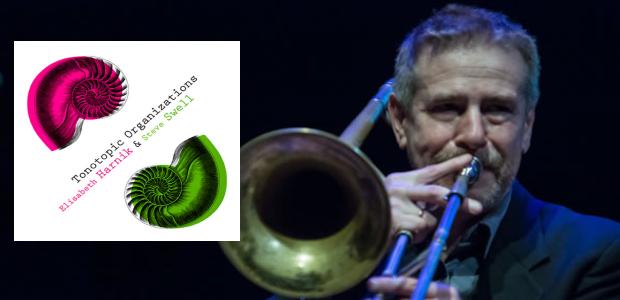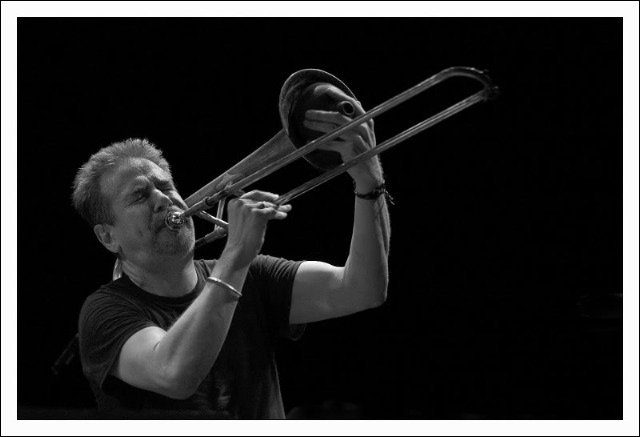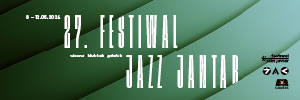It is important to find your voice - interview with Steve Swell

You are an active musician since 1975. You've recorded a lot of albums and played a lot of concerts. When and why was it easier to make your own music: in the beginning of your career or right now?
Steve Swell: When I first started playing music full time after high school in the 1970s, I really wanted to just make my living with music only, and to travel. It almost didn’t matter what kind of music I was playing. Music gave me that opportunity. So as much as I was originally drawn to jazz and the avant grade my goal at that age was to see the country and make my living primarily from music. It gave me a sense of pride and accomplishment. I did that for a good ten years or so.
When I finally got the “call” that I had to be exclusively involved in creative music, I was very lucky to have been invited into the bands of Lionel Hampton, Buddy Rich, Jaki Byard and Makanda Ken McIntyre in the mid-80s. Then I was asked to play in the bands of Herb Robertson, Tim Berne and Joey Baron. Those bands gave me some real visibility to the wider world. All of a sudden people were aware of me. I wasn’t really sure about how to present my own music during that time so I tried a variety of directions and having an interest in different areas of improvisation and composing those inclinations evolved over time into what l do now. I do think that I am freer now to approach a project I want to do and have a label or venue interested in it. It’s become easier to put projects together and have musicians interested in playing with me because musicians, promoters and labels know my track record over the years. Promoters and labels are more willing to book a band of mine now or a collective group I’m involved with and release a recording of that particular project largely because of knowing me and my music. Also, I grew up with the idea, and it was very common when I was younger, that you should be a sideman for a few years and learn from that experience and when the time is right, then you should branch out on your own which is how it happened for me. I’m not saying that is the right way to go or develop, it was just that that was a very real way musicians were taught, or indoctrinated, to do it and it seemed like most musicians I grew up with had that way of thinking about it.

I read that you've taken lessons from Roswell Rudd, Grachan Moncur III and Jimmy Knepper. What did you learn from them?
SS: Well, that’s a subject for an entire book! What all three of these trombonists/composers taught me through their playing, writing and lessons with them was that it is important to find your voice and to be an individual in this music. When I was growing up every trombone player I knew was trying to play like either JJ Johnson or Bill Watrous. I was one of those people too but as I really began listening to Roswell, Grachan and Jimmy Knepper, and other players, I really heard how different each musician was and what made them special and interesting. It was then that I really started to see I had to find out who I am and what I could bring to the music and my instrument.
Roswell Rudd was really like a second father to me in that he really woke me up, not just to the music, but through his music he woke me up to life! Hearing him for the first time when I was 15 fired up all the neurons in my head and heart and suddenly I was really engaged and interested in something for the first time and it was powerful and spoke directly to my spirit. Grachan, with his music did the same thing, but a little differently. He demonstrated how the connection of bebop can lead to a freer kind of playing using those sensibilities in a new way in both his improvising and composing. He was an amazing composer. I was studying with Roswell in the 1970s every week at a middle school in upper Manhattan and when Roswell couldn’t make the class he sent Grachan in to teach which is how I ended up studying with him. Also, a very valuable thing I got from him was how the use of “alternate positions” on the trombone can open you up. With the trombone there are many notes that you can play in different positions. For instance, Bb can be played in 1st position (there are 7 positions on the trombone) which brings the slide close to your body but it can also be played in 5th position which means you have to extend your arm out and that requires you to bring more of your body into play because you are physically extending yourself and not “scrunched” up close with your hands close to your chest. By playing a bunch of songs in class in those alternate positions (e.g.; Confirmation, Donna Lee) you were making full use of the body in your playing, more so than if you played them in the more “normal” positions. This is really how I got into using more of my body, or myself you can say, in my improvising and playing. It was a way to connect the body with the mind and the spirit.
Jimmy Knepper, I would say was more of a “Zen” type of teacher in that he was constantly challenging me. Not musically necessarily, but more about my commitment to this music. He was always saying to me “You don’t really want to play this kind of music, do you?” I mean, he really made me think, because I just always wanted to play this music but hadn’t thought about my motives or reasons for being a part of the music. But that didn’t last for too long because I always knew I wanted to be a part of this music, from the get go!!!

In 2018 you've released a solo album "The Loneliness of the Long-Distance Improviser". Are solo recordings a bigger challenge for a musician like you than group recordings?
SS: I’m not sure what you mean exactly but the act of doing a solo record or concert is very challenging in that it is you and only you making the music over an extended period of time. You have to have a super great deal of confidence and persistence to keep an audience interested in what it is you are doing whether it’s a live performance or on a recording. Plus you have to keep it all moving. Also, solo gigs or recordings inspire me to find out more about myself. The mental and spiritual aspect of it. The space in a solo context is completely unlimited in terms of sounds that are available and ways to organize them in a spontaneous way too. So, in reality, it can all be a challenge; solo gig or group gig but it comes down to not just your commitment in general but your commitment to yourself which ultimately is expressed in the music and that is always the mind set I go in with, even in rehearsals. Always recognizing the need to be in the moment.
You've just released an album with Elisabeth Harnik, which is called "Tonotopic Organizations". How was it to improvise with Elisabeth?
SS: This was new for us, our first tour and recording (live from that tour) so that is always a challenge to start with but you just have to trust yourself and hope you will find things that will connect and be interesting and make for a good musical experience. You of course also have to trust the other musician whoever it is. That takes a great deal of integrity and courage. So once things were set up for our tour we really just dove into the music which for me is the essence of that trust and allowing the moment and the energy from the audience and our own energy to take over to carry us through and to make some substantially good music. The both of us are pretty experienced improvisers so that helps in how we were able to make our sets interesting and create a nice flow. And we know from that experience that the more we perform together in the future the deeper the connection will become and our musical interactions will grow and develop.
What kind of musician and what kind of person is she? How would you describe her?
SS: Elisabeth is a fantastic musician and smart improviser who has a great deal of experience. She plays amazingly in any situation that comes her way. We spent a lot of time in the car, traveling around Austria and Italy and you really get to know someone that way, especially if it is just the two of you. Since you are in the car (or train) so much, there is a lot of time to talk about a variety of subjects. She was an extremely good “road” companion. She is a very open, curious person which shows itself in her music and that’s good for me because I am the same way and I’m always looking into how to make and organize music and sounds that are interesting. And she is also a terrific composer!

You've recorded an album which was a homage for Olivier Messiaen. Is he a big inspiration for you? Why did you decide to do this record?
SS: I wouldn’t say he is a big inspiration, but he certainly is an inspiration. I love his music and I love his back story. What he did with music, composing while he was in a concentration camp (Quartet for the End of the World) during the Second World War shows you a kind of bravery and persistence of hope while being under such a circumstance which broke and killed so many yet Messiaen was still able to create such a beautiful statement of life that we are fortunate enough to hear and experience today and take to heart this reminder to ourselves to keep hope alive within each of us and never give up and never give in.
So very special. His expression of hope is just so inspiring, especially in these times. The reason or idea for the record initially came from Lars-Olof Gustavsson of Silkheart Records. He approached me in NY and said he wanted to release a series of recordings inspired by some of his favorite composers and would I be interested. I of course jumped at the chance. The first one was for Bela Bartok called Kende Dreams. The Messiaen project was the second one. I am preparing music now for a recording dedicated to Berio. With each one I am able to explore some other sides to my own composing, try new things and to use different instruments I might not ordinarily use. Its been pretty challenging but totally great and fun. And I’ve been very happy with the results.

How are you doing without concerts? What do you miss the most?
SS: Well, I did my last pre-Covid concert on March 13. It was a tour with my band Kende Dreams that was funded by Jazz Road Tours a part of the SouthArts Alliance here in the US. I was lucky to have such a great band and great concerts to remember. The band had Rob Brown, William Parker and TA Thompson. It was marvelous. Our last gig was in Massachusetts. After I was home the next day, things started to fall apart like dominoes. My Stone Residency, a recording with Simon Nabatov, tours to Portugal, Germany, Poland. Everything just stopped. That weekend NYC decided to shut the public school system down so my work there too was immediately gone. Fortunately there was some financial relief from the government but that ended in July and there were some organizations that were helping musicians here to make ends meet. So that was extremely helpful. Also, my schools and students went to online learning.
What do I miss the most? Playing and performing for an audience is what I miss most. It’s where I get the most energy from and it’s how I shape a concert if I am leading and shape my own energy with other musicians, feeling the energy from a live audience. There’s nothing like it. I miss playing with other musicians the way we used to, with no worries or concerns. Just seeing my friends. I’ve been doing a few Zoom concerts and some live, streaming things with a limited, socially distanced audience but of course its just not the same but I am learning to cope with it and seeing that this new way of performing is just another extension of myself and I think it will become a permanent part of what musicians/performers will need to be able to do from now on.

You've played a lot in Poland for example with Mikolaj Trzaska. What were your favourite gigs and why?
SS: That is too hard to say! I love Poland! I have had so many great experiences there and support from different friends like Marek Winiarski, Daniel Radtke, Magdalena Dudek and Maciej Karlowski. I am sorry, but I am leaving too many people out. Ha! I think I’ve come to know Krakow so well now, many more wonderful gigs there than anywhere else in Poland probably but playing anywhere in Poland is great! I’ve played so many concerts in Poland which makes me feel lucky to have experienced so much of the country. Marek Winiarski’s NotTwo But Twenty anniversary festival was in Wlen, Poland in 2018. That was one of the very special gigs I would say. Many great musicians and friends together for several days playing and celebrating Markek’s label NotTwo. We were supposed to it again this year but the Pandemic made that impossible but I am sure it will happen again. Mikolaj Trzaska is definitely one of my good friends there that I have known now for some time, since 2007 maybe and I really enjoy his company and sense of humor. So very intelligent about many things, and his music, and playing with him, it is off the charts! Wonderful musician and human being and his wonderful wife Ola and their two kids, very special people. Also a part of my family came to the United States from the Galicia region in the early 20th century, so the country has a special place in my heart.
What are your plans for the near future?
SS: Mostly these days I practice like I normally do and write music and poetry. I finished a piece for ten trombones recently and I am working on other pieces. I am writing new music for my Kende Dreams band and listening and mixing some old recordings that will be released sometime soon. I am also organizing things for a time, hopefully, when the “lockdowns” and travel restrictions will be over. I have tentative tours for the spring and fall of 2021. I have great hope that everything will come back to normal and we can all be together playing or listening to music again and we will all be stronger and wiser from this strange and complicated time.
Also, not to get Covid-19. Wear a mask!!!
- Aby wysyłać odpowiedzi, należy się zalogować.







